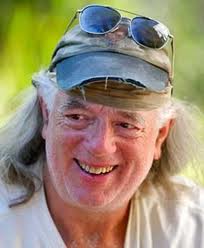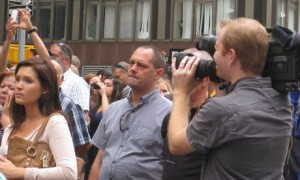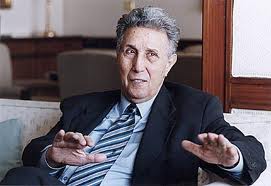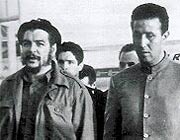By Bill Van Auken, WSWS.ORG, a socialist organization
1 October 2011
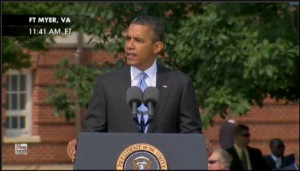
In a speech before a military audience in Virginia Friday, President Barack Obama boasted of the role of the CIA and US special operations units in the killing of Anwar al-Awlaki, a 40-year-old, New Mexico-born Muslim cleric. It marked the first time in history that an American president has publicly applauded the government’s assassination of a US citizen, who in Awlaki’s case has never been charged or indicted for any crime, much less tried and convicted in a court of law.
“The death of Awlaki is a major blow to Al Qaeda’s most active operational affiliate,” Obama said during a ceremony for the outgoing chief of US Joint Chiefs of Staff, Adm. Michael Mullen, at Joint Base Myer Henderson Hall in Virginia.
According to witnesses in Yemen as well as officials in Washington, Awlaki was killed by a Hellfire missile fired from a US pilotless drone as he was traveling in a convoy between Marib and al-Jawf provinces in northern Yemen.
Also killed in the strike was another US citizen, Samir Khan, a Pakistani-American who was identified as an editor of the Internet magazine, Inspire, which has been linked to Al-Qaeda in the Arabian Peninsula (AQAP). Several others also died in the missile strike.
US sources indicated that the operation was directed by the CIA, utilizing assets of the Pentagon’s Special Operations Command, implicating both the main US intelligence agency and the military in the extra-judicial killing of an American citizen.
In his remarks Friday, Obama charged that Awlaki “took the lead in planning and directing efforts to murder innocent Americans” and had “repeatedly called on individuals in the United States and around the globe to kill innocent men, women and children to advance a murderous agenda.”
US officials have called attention to Awlaki’s alleged email exchanges with Maj. Nidal Malik Hasan, who is accused of killing 13 people in a mass shooting at Fort Hood, Texas in 2009. They have also claimed that he was involved in two abortive terrorist attempts: that of the so-called “underwear bomber,” the former Nigerian student Umar Farouk Abdulmutallab, accused of trying to detonate explosives aboard Northwest Flight 253 as it was landing in Detroit, Michigan on December 25, 2009, and an attempt to mail bombs to Chicago-area synagogues.
While Awlaki has made numerous videotapes advocating armed attacks on American targets both within the US and abroad, the government has presented no evidence of his alleged role in actual terrorist operations.
An earlier attempt to carry out the targeted assassination of Awlaki was made last May, just five days after the US commando raid in which Al Qaeda leader Osama bin Laden was shot to death. As in his killing on Friday morning, the failed attempt last May was carried out with a drone missile strike.
Obama placed Awlaki on a “kill or capture” list of people targeted for assassination in January 2010 after his administration asserted a right not even claimed by the Bush White House: to carry out the summary execution of any US citizen deemed by the president to be a “specially designated global terrorist,” without presenting any evidence or securing any judicial sanction.
The Council on American-Islamic Relations issued a cautiously worded statement on the killing, repudiating Awlaki’s “incitement to violence” while calling on “our nation’s leaders to address the constitutional issues raised by the assassination of US citizens without due process of the law.”
The American Civil Liberties Union and the Center for Constitutional Rights both condemned the killing. The two organizations had joined in a federal court case challenging on constitutional grounds the White House’s claim that it had the right to target US citizens for assassination. They sought to represent Awlaki’s father, a former agriculture minister and prominent member of Yemen’s ruling party, who claimed that his son was not a terrorist.
The government sought the dismissal of the suit on the grounds that it would expose state secrets and that the president had the unreviewable power to kill any American that he deemed a threat. A federal judge threw the case out last December, ruling that Awlaki’s father had no standing to bring such a claim and that the court was not qualified to question the government’s decisions on national security.
In response to Friday’s killing of Awlaki, ACLU deputy legal director Jameel Jaffer said that the “targeted killing program violates both US and international law.” He charged that under this program, “American citizens far from any battlefield can be executed by their own government without judicial process, and on the basis of standards and evidence that are kept secret not just from the public but from the courts.”
Jaffer warned, “It is a mistake to invest the President—any President—with the unreviewable power to kill any American whom he deems to present a threat to the country.”
Vince Warren, the executive director of the Center for Constitutional Rights, said in response to Awlaki’s assassination: “The targeted assassination program that started under President Bush and expanded under the Obama administration essentially grants the executive the power to kill any US citizen deemed a threat, without any judicial oversight, or any of the rights afforded by our Constitution. If we allow such gross overreaches of power to continue, we are setting the stage for increasing erosions of civil liberties and the rule of law.”
Calling the death of Awlaki “another significant milestone” in the campaign to eliminate Al Qaeda, Obama declared in his speech Friday, “Furthermore, the success is a tribute to our intelligence community and to the efforts of Yemen and its security forces, who have worked closely with the United States over the course of several years.”
Obama further praised “the government and the people of Yemen” for having “joined the international community in a common effort against Al Qaeda.”
These statements were echoed by Defense Secretary Leon Panetta. The Pentagon’s press agency quoted Panetta as saying that the murder of Awlaki was a “testament to the close cooperation between the United States and Yemen.”
On the same day that the Yemeni regime and the Obama administration announced the killing of Awlaki, over 100,000 demonstrators were in the streets of the Yemeni capital, Sanaa, calling for the downfall of the country’s US-backed dictator Ali Abdullah Saleh. Hundreds if not thousands of Yemenis have died over the last eight months, fighting for the ouster of the three-decade old regime.
President Saleh returned to Yemen just a week before the killing of Awlaki, after spending three months in Saudi Arabia recovering from wounds suffered in a rocket attack on his presidential palace.
There is mounting speculation in Yemen that the link between his return and Awlaki’s death was more than coincidental; that the regime provided assistance in the killing of the US-born cleric in return for Washington’s aid in suppressing the mass popular upheavals that have shaken the country. Last year, the Obama administration doubled US military aid to the Saleh regime.
Many in Yemen dismissed the significance of the killing. “It will not be a blow to Al Qaeda of the Arabian Peninsula from any perspective,” Hakim al Masmari, editor in chief of theYemeni Post told the Al Jazeera network. “We don’t feel they will suffer, because [Awlaki] did not have any real role in [AQAP].”
The assassination of Awlaki in Yemen, together with the celebratory reaction of the American political establishment and the media, demonstrate once again that there exists no constituency within the American ruling elite and two major parties for the defense of the most basic democratic and constitutional rights, including the Fifth Amendment’s protection against being “deprived of life … without due process of law.”
The Bush administration held that such rights could be suspended in the name of a “global war on terrorism,” and now the Obama administration has taken the crimes of its predecessor a significant step further with the extra-judicial murder of a US citizen.
Having crossed this line, the precedent has been set for the White House, the Pentagon and the CIA using military violence and assassination not only as instruments of US imperialist policy abroad, but as the means of dealing with those deemed “enemies of the state” at home.
¶
ADVERT PRO NOBIS
________________________________________________________________________________________________________
IF YOU THINK THE LAMESTREAM MEDIA ARE A DISGRACE AND A HUGE OBSTACLE
to real change in America why haven’t you sent at least a few dollars to The Greanville Post (or a similar anti-corporate citizen’s media?). Think about it. Without educating and organizing our ranks our cause is DOA. That’s why our new citizens’ media need your support. Send your badly needed check to “TGP, P.O. Box 1028, Brewster, NY 10509-1028.” Make checks out to “P. Greanville/ TGP”. (A contribution of any amount can also be made via Paypal and MC or VISA.)

THANK YOU.
____________________________________________________________________________________________________
WhoWhatWhy – http://whowhatwhy.com –
Saudi Royal Ties to 9/11 Hijackers Via Florida Saudi Family?
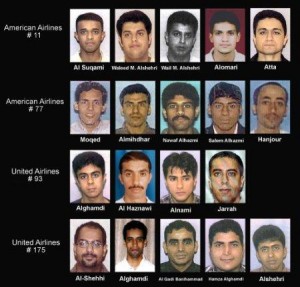
The official 9/11 hijackers. Who was behind them?
WhoWhatWhy has found evidence linking the Saudi royal family to Saudis in South Florida who reportedly had direct contact with the 9/11 hijackers before fleeing the United States just prior to the attacks. Our report connects some of the dots first laid out by investigative author Anthony Summers and Florida-based journalist Dan Christensen in articles jointly published in the Miami Herald and on the nonprofit news site BrowardBulldog.org [2].
In early September of this year, Summers and Christensen reported that a secret FBI probe, never shared with Congressional investigators or the presidential 9/11 commission, had uncovered information indicating the possibility of support for the hijackers from previously unknown confederates in the United States during 2001.
Now WhoWhatWhy reveals that those alleged confederates were closely tied to influential members of the Saudi ruling elite.

The House. Posh but not glaringly conspicuous.
As reported in the Herald, phone records documented communication, dating back more than a year, that connected a Saudi family then living in a house near Sarasota, Florida, with the alleged plot leader, Mohammed Atta, and his hijack pilots—as well as to eleven of the other hijackers. In addition, records from the guard house at the gated community tied Atta’s vehicle and his accomplice Ziad Jarrah to actual visits to the house. Although requiring further investigation, this information suggests that the house may have functioned as an operational base for the hijackers.
According to interviews and records examined by The Herald, Anoud and Abdulazzi al-Hiijjii and their young twins abruptly departed their home in Sarasota only days before September 11, 2001 and traveled to Arlington, Virginia, where they stayed briefly at another house owned by Anoud’s father, Esam Ghazzawi.
Then, still well before 9/11, the entire group, now including the father, flew to London and on to Riyadh, Saudi Arabia. The Sarasota house was sold in 2003, as was a penthouse apartment [4] in another DC, suburb, Rosslyn, Virginia. The Ghazzawis do not seem to have set foot again in the United States.
New Revelations
Building on these revelations, WhoWhatWhy has found documents laying out the Ghazzawis’ royal connections through a nest of Saudi corporations that share the name EIRAD. Esam Ghazzawi is director of EIRAD Management Company, the UK division of EIRAD Trading and Contracting Co. Ltd., which among other things holds the Saudi franchise for many multinational brands, including UPS. Esam’s brother Mamdouh, whose name shows up on public records associated with family properties in the U.S., is the Executive Managing Director of the parent firm, EIRAD Holding Co. Ltd. EIRAD has connections to the US government via contracts. In 2008, records show, the State Department paid EIRAD $11,733 [5] for rental of facilities, presumably in Saudi Arabia.
There is no indication that the company itself, or any of its officers or employees, have any connection to the 9/11 incident, or knowledge of anything regarding Mr. Ghazzawi’s activities in the United States. Calls for comment to the company’s main switchboard went unanswered during normal business hours; its website was not functioning properly and Saudi trade officials in the United States had not furnished alternative contact information at publication time.
But the now-revealed link between the Ghazzawis and the highest ranks of the Saudi establishment reopens questions about the White House’s controversial approval for multiple charter flights allowing Saudi nationals to depart the U.S., beginning about 48 hours after the attacks, without the passengers being interviewed by law enforcement—despite the identification of the majority of the hijackers as Saudis.
In addition, the new revelations draw further attention to a web of relationships that include the long and close business, personal and political ties between the Bush family and the Saudi royal family.
Saudi money is woven throughout business ventures connected to the Bushes. Saudi funds even helped bail out George W. Bush’s failing oil company early in his life. Jim Bath, a close friend of Bush in the Texas Air National Guard, went on to start a business in conjunction with two sons of powerful Saudi families—Khalid bin Mahfouz, whose family provides banking services to the Saudi royals, and Salem bin Laden, heir to the bin Laden family’s global construction empire and a half brother to Osama bin Laden. (For a detailed probe of the Bush family’s dealings with the Saudis, including substantial previously unreported material, see my book, Family of Secrets: The Bush Dynasty, America’s Invisible Government and the Hidden History of the Last Fifty Years [6].)
Details of The Herald’s Revelations
The Ghazzawi presence in the Sunshine State predated 9/11 by at least six years. In 1995 a young Saudi woman named Anoud Ghazzawi living in South Florida married a fellow Saudi native, Abdulazzi al-Hiijjii (English spellings of his first name and surname vary, as is typical of Arabic names.) Anoud’s father, Esam, and his American-born wife Deborah bought the couple a stylish, three-bedroom house in a gated community in Sarasota. The house remained in the elder Ghazzawis’ names while the young couple lived there and began a family.
Six years later, less than two weeks before the 9/11 attacks, Anoud, Abdulazzi and their children left their home on or about August 30, 2001 in great haste, taking off in a white van. This was about the same time that the hijackers were purchasing their tickets for the targeted flights.
The family apparently left with no advance planning, leaving behind almost all their possessions, abandoning three recently registered vehicles, including a brand-new Chrysler PT Cruiser, in the garage and driveway. As the Herald article [7] explained:
“there was mail on the table, dirty diapers in one of the bathrooms … all the toiletries still in place … all their clothes hanging in the closet … opulent furniture, equal or greater in value than the house … the pool running, with toys in it….The beds were made … fruit on the counter … the refrigerator full of food. … It was like they went grocery shopping. Like they went out to a movie … [But] the safe was open in the master bedroom, with nothing in it, not a paper clip. … A computer was still there. A computer plug in another room, and the line still there. Looked like they’d taken [another] computer and left the cord.”
After public disclosure of Saudi involvement in the 9/11 attacks, people in the gated community took note of the rushed departure and disappearance of the Ghazzawi-al-Hiijjiis. After all, the attackers were not just overwhelmingly of Saudi nationality, but three out of four of the future hijackers had lived and trained to fly in Venice, Florida, just 10 miles away from the house.
The complex’s security officer alerted the FBI, which began an investigation into the house at 4224 Escondito Circle. (In addition, a suspicious neighbor alerted the FBI by email on the day of the attacks.)
The Justice Department declined to give the Herald a statement, but, according to an unnamed senior counterterrorism officer who was one of two people who got into the house first and served as a key source for the paper, the investigation bore stunning fruit.
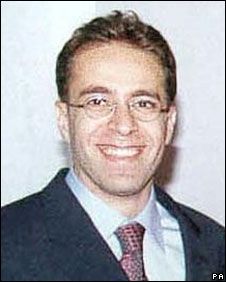
Ziad Jarrah
Phone records showed communication, dating back more than a year, that connected those in the house with the alleged plot leader, Mohammed Atta and his accomplices, including eleven of the other hijackers. Other records, kept by guards at the gated community, documented numerous visits to the house by a vehicle known to have been used by Atta, and indicated the physical presence in the car of Atta’s purported accomplice Ziad Jarrah. It appeared as if the Ghazzawi house was some kind of nerve center for the entire operation.
According to the senior counterterrorism officer, both Esam Ghazzawi and his son-in-law al-Hiijjii had been on a watch list at the FBI predating 9/11. An unnamed U.S. agency tracking terror funds had also taken an interest in them. “464 was Ghazzawi’s number,” the officer said. “I don’t remember the other man’s number.”
Continue to Page 2 of 3 [9]
WhoWhatWhy plans to continue doing this kind of groundbreaking original reporting. You can count on it. But can we count on you? We cannot do our work without your support.
Please click here to donate [10]; it’s tax deductible. And it packs a punch.
Secrecy Reveals Little Official Curiosity—or Coverup?
These stunning revelations—said to be based on the work of the swarm of FBI agents who descended on the gated community in the fall of 2001—would surely have generated headlines worldwide if they had become known after 9/11. But the FBI, for reasons unknown, failed to provide the information to Congressional 9/11 investigators or to the presidential 9/11 commission, and thus it has remained a secret for the past decade.
In response to the Herald article, the FBI has issued a statement [11] saying that the occupants of the house had been tracked down and interrogated, and were found to have no connections to the hijackers. It is not clear when these interrogations are supposed to have taken place, or whether they were conducted by the FBI or by Saudi intelligence. But given the FBI’s poor track record for candor in the matter, the statement is being viewed with some skepticism.
Adding to these doubts is an ineffective effort by the Bureau to woo the house owners back to Florida. According to Scott McKay, a lawyer for homeowners’ association of the gated community, known as Prestancia, the FBI attempted to convince the Ghazzawis they needed to come back in person to sign documents related to unpaid back dues to the association. This attempt proved unsuccessful when the Ghazzawis simply arranged to sign the documents elsewhere. These facts, reported by The Herald, raise questions about the U.S. government’s determination to interview the couple: Esam Ghazzawi’s signature was notarized in Lebanon—by a U.S. official no less—the vice consul at the US embassy in Beirut. His wife’s signature was also notarized—elsewhere in the United States, in Riverside County, California.
The emergence of this information chagrined Bob Graham, the former Florida U.S. Senator. Graham was Senate Intelligence Committee chair (and a 2004 candidate for the Democratic presidential nomination) and served as co-chair of the congressional joint inquiry into 9/11. “At the beginning of the investigation,” he told The Herald, “each of the intelligence agencies, including the FBI, was asked to provide all information that agency possessed in relation to 9/11.” Graham noted that the Bureau also failed to turn over information connecting the hijackers to other Saudis living in California, which his own investigators later discovered on their own.
Just as strange, when Graham’s congressional investigators turned over a large body of information on the hijackers they had assembled to the presidential 9/11 Commission, it seemed uninterested. “They did very little with it,” Graham said, “and their reference to Saudi Arabia is almost cryptic sometimes. … I never got a good answer as to why they did not pursue that.”
About the new discovery in Sarasota, Graham said it “opens the door to a new chapter of investigation as to the depth of the Saudi role in 9/11.”
All Eyes on Prince Sultan
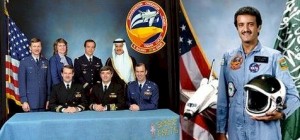
-
Prince Sultan bin Salman
Of special interest is the Ghazzawis’ boss, the chairman of EIRAD Holding Co. Ltd., Prince Sultan bin Salman bin Abdul Aziz Al-Saud [13]. He is a prominent and powerful member of the ruling Saudi royal family who is expected to become crown prince, and thereby in line to become king. Born in 1956, which makes him approximately the same age as the Ghazzawi brothers, Prince Sultan bin Salman is a grandson of King Abdul Aziz (commonly referred to as Ibn Saud), founder of modern Saudi Arabia.[1] [14]
1. Saudi lineages are complicated due to men being named for their ancestors. For example, Prince Sultan (Prince Sultan bin Salman) should not be confused with his uncle, also known as Prince Sultan (Prince Sultan bin Abdul-Aziz Al Saud), who is Defense Minister and Crown Prince, or his late cousin Prince Sultan bin Faisal.
Prince Sultan’s family is of enormous importance in today’s Saudi Arabia. His father, Prince Salman, has been the governor of the province of Riyadh (the city of Riyadh is the Saudi capital) since 1962, and is considered an arbitrator among the frequently warring members of the Saudi royal family, with its 4000 princes. Salman is the second youngest of the so-called Sudairi Seven, an extremely powerful alliance of full brothers jockeying for power in the country.
A leading advocate of teaching Saudis to fly, Prince Sultan is the founder and Chairman of the Board of the Saudi Aviation Club, and Chairman of the King Khaled International Airport [16] (KKIA) Supervisory Committee. Since 2000, he has also headed Saudi Arabia’s tourism commission [17], placing him among a handful of the King’s grandsons to hold ministerial rank. One of his missions as head of the tourism commission is to repair the damage to Saudi Arabia’s image caused by the 9/11 attacks.
In a document [18] released by Wikileaks, the U.S. Ambassador to Saudi Arabia, James B. Smith, characterizes Prince Sultan this way: “With a powerful father who is the Governor of Riyadh and a strong candidate to be the next crown-prince, Sultan is well positioned to move up the Saudi government ranks… Sultan has visited almost every state [in the U.S.]. He joked with the Ambassador that ‘perhaps the only states he has not yet visited are the Dakotas.’ ” (He is extra well connected, with one brother serving as the deputy oil minister)
Prince Sultan is closely allied with Prince Bandar bin Sultan bin Abdul-Aziz Al Saud, the former longtime ambassador to the United States, who is often called “Bandar Bush” for his friendly relationship with the Bush family. Sultan and Bandar have worked together for years to promote Saudi interest in aviation.
The Bushes and the Royals
The Bush family have long been regarded as friendly with the prince’s family and their associates. Prince Sultan’s NASA mission is perceived as having been orchestrated [19] by George HW Bush as a favor to the Saudis. Associates of the Bush family have many connections with the Prince’s family. Prince Sultan’s father’s legal counsel is William Jeffress Jr, of Houston-based Baker Botts LLP [20], where James A. Baker III, longstanding advisor to the Bush family, including both Presidents Bush, is a senior partner. At the time of the 9/11 attacks, Baker held the post of Senior Counselor for the Carlyle Group [21], a global asset management firm which is heavily invested in military contracting stocks [22]; among Carlyle’s large investors were the bin Ladens. (In a curious coincidence, Baker watched the live television coverage of the attacks from the Ritz-Carlton Hotel [23] in Washington, where he and representatives of Osama bin Laden [24]‘s extended family [25] were attending the Carlyle Group’s annual conference. In another odd coincidence, President George W. Bush himself was in Sarasota, reading to schoolchildren, at the very time the Sarasota-area-based terrorists were hijacking the planes. Indeed, he was a short distance from the home the Ghazzawis had recently abandoned.)
President Bush’s actions in the aftermath of the World Trade Center and Pentagon assaults with regard to the Saudi royal family have long been known but have yet to be fully explored. Shortly after the attacks, President Bush permitted an exception to the ban on air traffic so that planes could take prominent Saudis out of the country. One of those leaving on the flights was the late Prince Ahmed bin Salman, brother of Prince Sultan.
In a 2004 letter [26] to the New York Times, Prince Sultan responded to allegations surrounding those flights, and pointed to a conclusion in the 9/11 commission report: ”Our own independent review of the Saudi nationals involved confirms that no one with known links to terrorism departed on these flights.” (Another Saudi who left the US after 9/11 was the architect Abdel Wahed El-Wakil, [27] who had a base in Miami and serves as an advisor to Prince Sultan.)
Allegations of Saudi Royal Complicity
Sultan’s brother Prince Ahmed was the most westernized of the Saudi set. He raised racehorses in Kentucky and was the owner of the 2001 Kentucky Derby winner, with the perhaps unfortunate name “War Emblem.” Allegations concerning Prince Ahmed emerged in the 2003 book, Why America Slept, by the bestselling author Gerald Posner. Posner says that intelligence sources told him how in March, 2002, under interrogation (but before he was waterboarded 83 times in August [29]), Al Qaeda’s purported chief of operations, Abu Zubaydah, relaxed and began cooperating. Tricked into thinking he was in Saudi custody, Zubaydah asked his interrogators to call a senior member of the Saudi Royal family, who he said was his contact. He provided, from memory, the man’s private home and cell phones. This contact, according to Posner, was Prince Ahmed.
Zubaydah is alleged to have said that Osama bin Laden had cut a deal with a top Pakistani military official, Air Marshal Mushaf Ali Mir, who was close to Islamist elements in Pakistani intelligence. According to this account, the Saudi intelligence chief, Prince Turki, signed off on this, and agreed to provide aid to the Taliban in Afghanistan and not to go after Al Qaeda so long as the terrorist group kept its gun sights trained away from the Saudi royals.
In this version of events, Zubaydah is said to have also implicated Prince Sultan, along with another cousin, Prince Fahd bin Turki bin Saud al-Kabir, as Al Qaeda backers, and to have claimed that the Pakistani Air Marshal Mushaf Ali Mir and Saudi Prince Ahmed knew in advance about the 9/11 attacks.
Though the interrogators were skeptical of these claims, Zubaydah often proved credible. Information he provided led to the capture of a senior al-Qaeda operative in Southeast Asia. Zubaydah would only talk when he thought he was in Saudi hands. When U.S. personnel, no longer posing as Saudis, confronted him, Zubaydah said he had made up his earlier statements. But investigators found no basis for believing the information to be false—and even found material that corroborated his claimed ties to high level Saudis. Not surprisingly, the Saudi and Pakistani governments insisted his claims were false in all respects.
One of the key figures named by Zubaydah, Prince Turki, had been removed from his position as Saudi intelligence chief on September 1, 2001, ten days before the attacks. Thus, he was apparently not in that post on the critical day. Yet, his removal was a temporary absence from the highest levels of Saudi leadership, and not necessarily an indication that he had fallen into serious disfavor. The next year, he was named Saudi ambassador to Great Britain, just as a shift in focus from Al Qaeda to Iraq was being pitched to the British. If Zubaydah’s claims are at all credible, the removal of Turki from an official position shortly before the attacks surely warrants additional analysis— as does the Ghazzawis’ hasty flight from the U.S. right in the same time frame.
According to the book The Eleventh Day [30], by Summers and his co-author Robbyn Swan, Zubaydah is not alone in asserting a Saudi-Al Qaeda deal:
In sworn statements after 9/11, former Taliban intelligence chief Mohammed Khaksar said that in 1998 Prince Turki, chief of Saudi Arabia’s General Intelligence Department (G.I.D.), sealed a deal under which bin Laden agreed not to attack Saudi targets. In return, Saudi Arabia would provide funds and material assistance to the Taliban, not demand bin Laden’s extradition, and not bring pressure to close down al-Qaeda training camps. Saudi businesses, meanwhile, would ensure that money also flowed directly to bin Laden.
¶
ADVERT PRO NOBIS
________________________________________________________________________________________________________
IF YOU THINK THE LAMESTREAM MEDIA ARE A DISGRACE AND A HUGE OBSTACLE
to real change in America why haven’t you sent at least a few dollars to The Greanville Post (or a similar anti-corporate citizen’s media?). Think about it. Without educating and organizing our ranks our cause is DOA. That’s why our new citizens’ media need your support. Send your badly needed check to “TGP, P.O. Box 1028, Brewster, NY 10509-1028.” Make checks out to “P. Greanville/ TGP”. (A contribution of any amount can also be made via Paypal and MC or VISA.)

THANK YOU.
____________________________________________________________________________________________________





